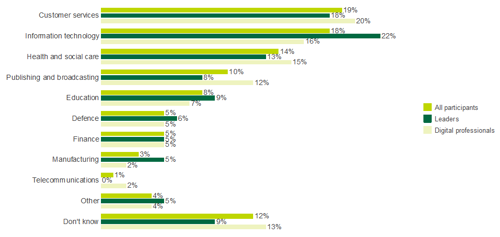AI impact
With the option to choose only one we also wanted to know on which of the following sectors do respondents feel AI will have the greatest impact in 2024:
As this question also included verbatims, we asked ChatGPT to summarise the answers.
- Healthcare and social care: AI is expected to significantly improve personalised care plans, diagnostic processes, and treatment paths due to its ability to process and analyse large volumes of clinical data. It could alleviate pressure on healthcare systems and enhance patient experiences
- Education: there is potential for AI to customise learning experiences, which could lead to better engagement and knowledge retention among students. However, it also raises concerns about academic integrity and the need for policy adjustments in educational institutions
- Customer service: AI is seen as a tool to streamline service workflows, handle first-line customer inquiries, and improve the overall customer experience. There is a belief that as AI becomes more advanced, it could take on a larger role in customer service positions
- IT and cybersecurity: AI is anticipated to be integral in transforming IT services, improving efficiency, and responding to cybersecurity threats. The sector may lead in demonstrating how AI can be adopted across other industries.
- Finance: there is a view that AI will enhance financial analysis and fraud detection. AI's ability to process large datasets could lead to more accurate market predictions and risk assessments
- Content creation and media: respondents expect AI to contribute to generative content, impacting journalism, social media and digital content creation. This could lead to faster production of content but also raises issues about the devaluation of human creativity
- Defence: AI's impact on the defence sector could be profound, potentially accelerating decision making processes and operational efficiency, but it also poses safety and ethical concerns
- Manufacturing and logistics: AI could improve efficiency and cost-effectiveness in these sectors by optimising production processes and supply chains
- Software engineering: AI is helping to automate tasks in software engineering, increasing efficiency and potentially reducing the workforce
- Legal sector: AI might be used to create legal documentation, which could impact the volume of manual legal work
- General business: AI is seen as a tool that can automate many processes, support decision making, and potentially cut costs across various industries.
In conclusion, as ChatGPT rather prosaically informs us: concerns are raised about the potential misuse of AI, the need for ethical deployment, and the importance of ensuring the technology is safe and unbiased. There's also an emphasis on the need for AI to adapt to and enhance human actions, rather than simply replacing them.









